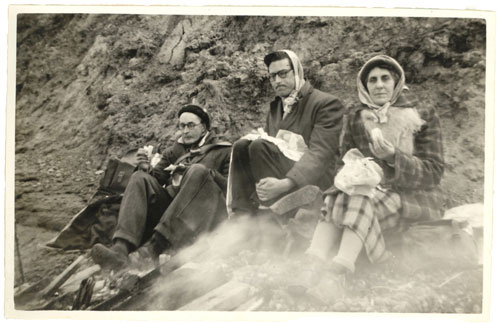The J J Wymer Archive
Lorraine Mepham, 2008. https://doi.org/10.5284/1000062. How to cite using this DOI
Data copyright © Lorraine Mepham unless otherwise stated
This work is licensed under the ADS Terms of Use and Access.
Primary contact
Wessex Archaeology
Portway House
Old Sarum Park
Salisbury
SP4 6EB
UK
Tel: 01722 326867
Fax: 01722 337562
Resource identifiers
- ADS Collection: 826
- ALSF Project Number: 5088
- DOI:https://doi.org/10.5284/1000062
- How to cite using this DOI
Introduction

John Wymer eating lunch in the snow with his parents at Reculver, Friday March 21st 1958. From Notebooks Volume 3, Page 219.
The Wymer Archive Project arose out of a perceived threat to Dr John Wymer's personal archive following his death early in 2006. John Wymer was Britain's foremost specialist in Palaeolithic archaeology, with an unparalleled knowledge of Quaternary geology and the earliest human artefacts in Britain that are occasionally associated with these deposits, and much of his work was carried out as a direct or indirect result of mineral extraction. His personal archive forms a collection of national importance.
A project with the primary aim of securing the survival of this archive was initiated in October 2006, commissioned by English Heritage with the support of the Aggregates Levy Sustainability Fund (ALSF). Examination of the archive suggested that the most important elements in what was considered to be a unique record of British Palaeolithic archaeology were Wymer's Field Note Books (1949-2004), and his card index of every known Lower and Middle Palaeolithic artefact from Britain. The latter formed the basis of the English Rivers Palaeolithic Project (TERPS), the results of which were published in 1999 as The Lower Palaeolithic Occupation of Britain. This archive presents Wymer's Field Note Books - the TERPS database and the resulting published volumes form another ADS archive.
As part of the development of the Wymer archive, and in order to disseminate to public and professional audiences the full benefits of knowledge gained through past work in advance of aggregates extraction, John Wymer's Field Note Books have been digitised.







